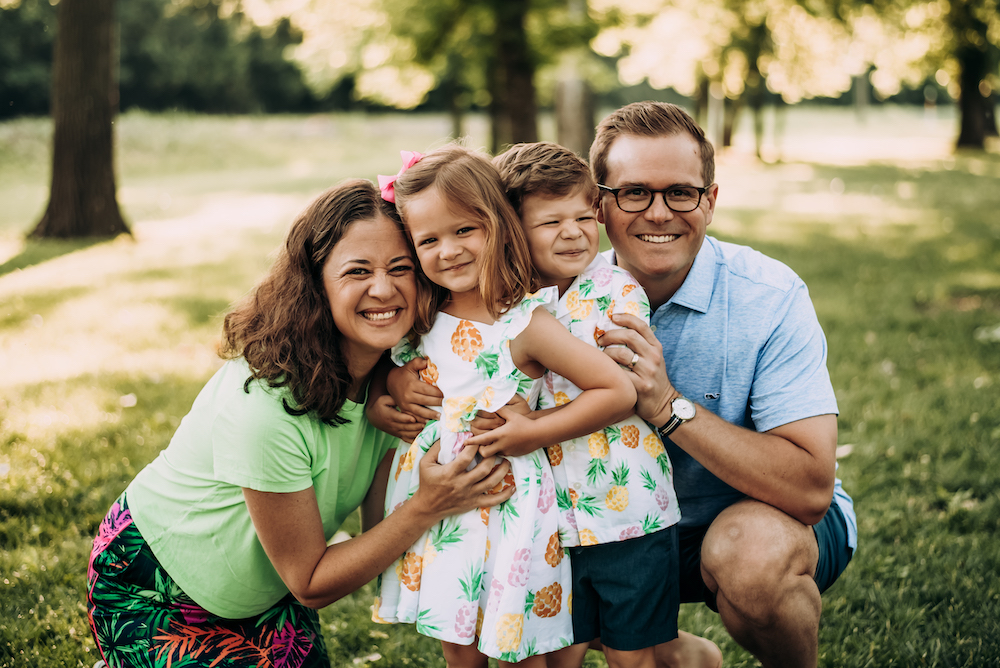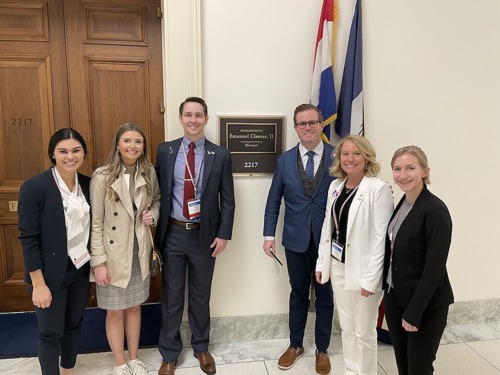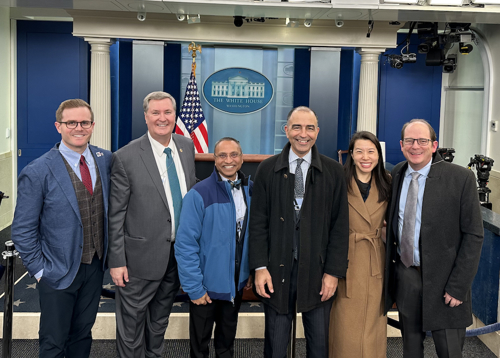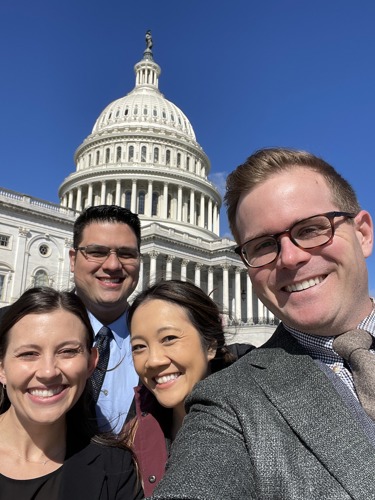10 Under 10: Pediatric dentist brings persistence, policy straight out of Pierre, South Dakota

Pierre, South Dakota, is remarkable in a few ways: It’s the capital of the state, it’s probably not pronounced how you think it should be, and it’s churned out a lot of dentists, anecdotally speaking, for such a small town — population 14,000ish.
At least, that’s the perspective of native son Aaron Bumann, D.D.S., a recipient of a 2023 ADA 10 Under 10 Award.
Dr. Bumann enjoyed a pretty idyllic childhood in Pierre as one of four children: a younger brother and sister and his own identical twin.
“I grew up on small town Americana,” he said. “We played outside and hung around at the pool. In the winter, we played sports and did the arts. Just anything and everything I could get my hands on, we were just busy with it all the time. The arts were really important to me too growing up. I sang in different choirs and was always in different theater productions.”
About that town name. It’s pronounced like “peer” or “pier” instead of the name derived from a French-born fur trader.
“Somewhere along the line, we decided we didn’t want to be French,” he said. “They wanted it Anglicized, so they called it ‘peer’ instead.
However it’s pronounced, it was a veritable incubator for Dr. Bumann’s career choices that dovetail his interest in dentistry and policy. Influencing his attraction to dentistry was his mother’s career as a dental hygienist.
“Fun fact. Within the practice that my mom worked, I think of his patients, within two or three years of me graduating high school in a class of like 200 kids, there were seven dentists,” he said. “It’s just a very popular profession for my hometown. I don’t know why. And it’s a pretty small town, so to have that many doctors to come out of that small of a place in that short period of time is kind of a unique thing.”

Dr. Bumann’s calling to help shape policy was underscored by the fact that politics were so pervasive.
"With only one school district in town, we thought it was completely normal to go to school with the governor's kids. No one thought anything of it,” he said. “Being a small-town state capital, a lot of families worked for the state, so policy and politics were an everyday topic. Being involved was a normal part of life in Pierre."
His foray into dentistry wasn’t so cut and dried. Both his parents were first-generation college graduates, and Dr. Bumann is the first in his family to pursue an advanced degree.
“There are a lot of pros and cons to that,” he said. “There’s a ton of family pride that comes along with that but not a lot of coaching other than, ‘You’ll do great!’ ... When I got to dental school, there were people [from] multiple generations of college and multiple generations of doctors. They just have an understanding as to the kind of rigor that’s expected. There was a bit of a learning curve for me in that regard [but] not in a bad way. I just didn’t know what it took until I got there.”
“Getting there” took persistence, resilience and patience. Dr. Bumann was a three-time dental school applicant at his top choice. After undergraduate study at Bethel University in St. Paul, Minnesota, where he majored in biology, he applied to other dental schools but was particularly interested in the University of Minnesota School of Dentistry.
“When I did finally get in at Minnesota, I went and talked to the dean of admissions, and I said, ‘Just out of curiosity, what changed this time around because I feel like I’m the same me that I was the first time that I applied?’” Dr. Bumann said. “She said, ‘Well, yes, but no. Your commitment to rural dentistry, your commitment to people that don’t have access to care was something that was abnormal. You stuck it out for three years doing a job that most people wouldn’t have done for six months, and that is something that we really need in this profession.’ I told her, ‘I don’t know if I’m always going to do rural. But I do promise you that I’m always going to be treating people that don’t have access to care anywhere else.’"

While awaiting selection for a spot in dental school, Dr. Bumann worked as a dental assistant with a mobile care unit back at home in Pierre. The unit was a collaboration between the Ronald McDonald House and Delta Dental Foundation of South Dakota. He appreciated that they delivered care beyond diagnosis and cleanings.
“We weren’t just the traditional mobile dental unit that would come in and burn up all the hygiene money and then say, ‘Well, you’ve got cavities. See you later,’” he said. “We were really about trying to take care of people in places where nobody was taking care of them.
After graduating from the University of Minnesota in 2013, Dr. Bumann completed a pediatric dental residency at Geisinger Medical Center in 2016. He has spent the better part of a decade advocating for the oral health issues of infants, children, adolescents and patients with special health care and developmental needs.
While in dental school, he was active with the American Student Dental Association and pursued experiences to support his interest in policy.
“I was an intern for the ADA office in D.C.,” Dr. Bumann said. “I got to know their staff, and I got to know what the ADA was doing on the regulatory and government level, and I’ve never stopped since then.”
Indeed, he’s clearly compounded his interest and efforts in advocacy, his avowed favorite aspect of his career.

Dr. Bumann serves as a public policy advocate for Missouri with the American Academy of Pediatric Dentistry and as an action team leader for the Missouri Dental Association and American Dental Association. He served on the Medicaid Subcommittee at the Missouri Coalition for Oral Health. Their efforts, conjoined with others’ throughout the state, sparked policy changes, particularly increasing woefully low Medicaid dental provider rates up to commercial level rates.
Dr. Bumann spends much of his time as a private practice pediatric dentist in Kansas City, Missouri, and has previously lectured as an adjunct professor at the University of Missouri, Kansas City to dental students about pediatric dentistry, personal finance and advocacy. He occasionally delivers “lunch lectures” at the university on topics such as advocacy, organized dentistry, Medicaid and ethics.
His wife, Erin Ealba Bumann, D.D.S., Ph.D., is also a dentist. They have two children: a son who is 5 and a daughter who is 4.
“My wife is a D.D.S./Ph.D.,” he said. “She’s a pediatric dentist as well, so she’s actually on faculty at the dental school here. That’s what brought us here — her faculty position. We were looking all over the country, and it just happened to be that this was the best place for us when the dust settled. We never thought we would live here, but it’s been a great place for us.”
When not working, Dr. Bumann golfs solo or with friends and colleagues. He otherwise can be found poolside with his family.
“We hang out, we swim, we chat,” he said. “My wife and I both enjoy cooking, so we spend a lot of time in the kitchen. Those are the things that to me matter the most — my time with my kids and my family.”



